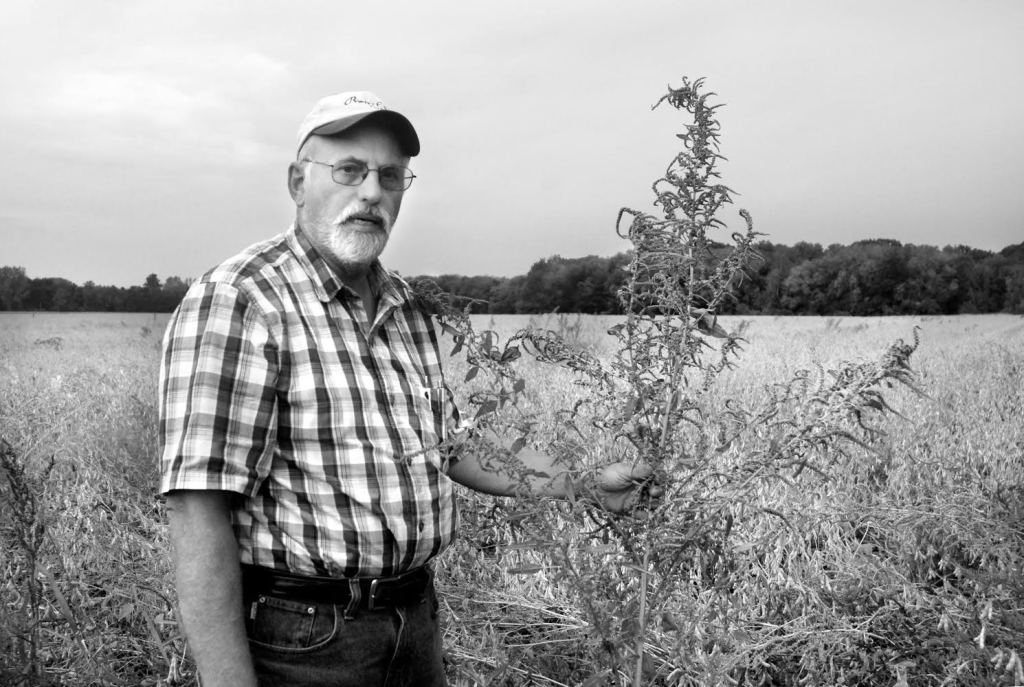Super Weeds Tell Story of Soil Imbalance

Cutline: Central Illinois farmer Dave Bishop stands next to a giant “super weed” in a chemically-treated soybean field shortly before harvest. Bishop’s organic soybean field just to the east has none of the “super weeds” that are resistant to chemical herbicides.
Central Illinois organic farmer Dave Bishop can stand at the edge of a chemically-treated soybean field, and giant “super weeds” tower over his 6-foot frame. Yet, his organic field nearby has no super weeds.
Farther east, organic farmer Wes Jarrell saw stands of tall super weeds rise from fields like forested islands in a sea of soybeans.
These weeds have evolved, as Charles Darwin predicted (“On The Origin of Species by Means of Natural Selection”), and are now resistant to herbicides. This poses a significant problem for industrial farmers, but the problem impacts all of us in terms of chemical drift and food security.
These towering stands of weeds were particularly noticeable this past summer because heavy rains drowned out swatches of corn and soybeans, and super weeds took over the bare ground. In some southern states, cotton fields have been lost to productive agriculture because of super weeds.
“You can’t knock them down with herbicides,” Jarrell said.
EPA Approves Another Controversial Herbicide for Illinois and Five Nearby States
The solution proposed by agrichemical companies is to apply more herbicides. The federal government recently approved Dow AgroSciences Enlist Duo for GE (genetically engineered) crops in Illinois and five nearby states. Enlist Duo, a combination of glyphosate and 2,4-D, is so potentially dangerous, the EPA put several new restrictions on its approval.
“When the first generation of GE corn and soybeans were introduced, there were warnings about plant resistance,” said Wes King, executive director of Illinois Stewardship Alliance, a not-for-profit based in Springfield. “Now here we are trying to solve a problem by using the solution that caused the problem.”
One scientist wrote recently in Community Word that the USDA estimates 2,4-D applications will increase by up to 600 percent. An ingredient in Agent Orange, 2,4-D has been linked to reproductive problems, non-Hodgkin’s Lymphoma and Parkinson’s Disease.
King said this increased use of herbicides is coming at the same time Illinois is trying to increase fruit and vegetable production, apiaries and vineyards.
“Industry claims this new formulation will not volatilize and drift. I’ll wait to see,” King said. “I see the day of reckoning coming. I’m concerned we cannot coexist.”
King said climate change and drought in California means that region will not be able to continue to produce fruit and vegetables for the nation. Demand will shift to other states including Illinois, but these so-called specialty crops are sensitive to chemicals used on corn and soybeans.
King said the Illinois Pesticide Act must be strengthened.
“The goal is not to restrict use on someone’s own property, but other properties must be protected from drift,” he said. “Pesticide drift threatens local food and wine. It prevents us from taking advantage of more fruit and vegetable operations to fill the void created because California can’t sustainably produce the same level of specialty crops into the future.”
Jarrell said most organic operations are comparatively small at below 20 acres, and they have boundaries rubbing shoulders with chemical operations prone to drift.
Natural Weed Control
There was an infestation of mare’s tail weeds in one of Bishop’s organic fields some years back. He consulted with Bill Becker, a Springfield-based organic crop consultant with a Ph.D. in plant pathology from University of Illinois.
Becker took one look and said the weed is indicating the soil is deficient in zinc. An application of zinc eliminated the infestation the following year.
“Weeds try to make the soil better,” Becker said, noting that if soil is deficient in zinc, certain weeds grow to add zinc.
“Why fight weeds with chemicals? It will be a constant battle until the farmer learns how to understand what weeds are telling us,” Becker said. “My solutions are very cheap. It’s much less expensive to add some zinc sulfate rather than chemical herbicides.”
The pesticide industry deals with poison technology, and the human genome is related to all living things so poisoning one poisons all, Becker said.
He uses plant tissue samples and soil analysis to understand what weeds are telling us.
On his farm, Bishop explores a variety of options for weed control. One plot on his property is a research site for Sam Wortman, Ph.D. at University of Illinois, who studies non-chemical weed control.
“The evolution of weed resistance has increased with increasing pesticide use,” Wortman said. “If farmers use integrated pest management and some little hammers like crop rotations and cover crops, we could avoid big hammers and use herbicides selectively and sustainably. But given the current paradigm, resistance is increasing at a rapid pace.”
Bishop said, “When I was in high school, Earl Butz said to farmers ‘get bigger or get out.’ I didn’t want to get big, and I didn’t want to get out. I started conventionally (with chemical pesticides and therapeutic antibiotic use for hogs), and I didn’t like what I was doing.”
He spent more than 25 years developing his organic operation.
“We have proven that organics is a viable alternative to the industrial model,” he said. “The organic way is working with a natural system, feeding the soil. It’s a fundamental change in thinking that challenges the current thinking of chemical use. For organic farmers, super weeds are not an issue.”

Recent Comments